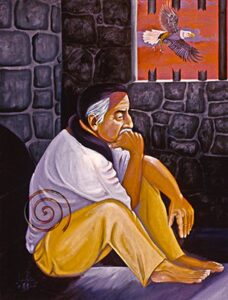Leonard Peltier 89637-132
USP Coleman I, U.S. Penitentiary, POB 1033, Coleman, FL 33521.
(life)
(Native American political prisoner framed for abetting murder while defending traditional indigenous from threats including uranium mining on sacred lands)
15-Point Font. Plain White Envelope and Paper. No Glitter. No Stickers. No Perfume. NO CARDS!!!
xxx
from the Guardian
Indigenous activist Leonard Peltier, convicted over 1975 FBI killings, denied parole
Peltier, 79, in poor health and sentenced to life over two deaths in South Dakota, not eligible for another hearing until 2026
Leonard Peltier, the 79-year-old Indigenous activist who has spent nearly 50 years in prison for the 1975 murders of two FBI agents, has been denied parole. Many fear the ruling all but ensures that the longest-imprisoned Indigenous American will die behind bars.
Peltier has maintained his innocence since he was arrested in connection with the deaths that occurred at the Pine Ridge Indian reservation in South Dakota. For decades, advocates such as Coretta Scott King, Nelson Mandela, Pope Francis and James H Reynolds, the US attorney who handled the prosecution and appeal of Peltier’s case, have fought for his release.
Despite evidence of prosecutorial misconduct and due process violations throughout his trial, Peltier will now remain in prison at least until 2026, when the US Parole Commission set his next hearing. His health has severely declined over the past few years, and his supporters considered his most recent hearing, which occurred last month, his last chance of not dying in prison.
On 26 June 1975, years-long tensions between Oglala Lakota traditionalists, who sought to govern in customary ways, and assimilationists, who wanted to adapt to American standards of governance, culminated in a standoff at the Pine Ridge Indian reservation. Two FBI agents in unmarked cars pursued a vehicle they believed to be operated by Jimmy Eagle, for whom they were serving an arrest warrant, onto a part of the reservation that was occupied by traditionalists.
In the chaos, a shootout erupted and the FBI agents were soon joined by more than 150 Swat team members and other law enforcement. By the end, two FBI agents and a member of the American Indian movement (Aim) – a cold war-era liberation group that supported the traditionalists – had been killed.
Peltier was among the four men who were indicted in connection with the agents’ murders.
Since then, the FBI has been the staunchest opponent of Peltier, his claims of innocence and his supporters’ calls for his freedom. Mike Clark, president of the Society of Former Special Agents of the FBI, called Peltier a “cold-blooded murderer”. When Bill Clinton had the opportunity to pardon Peltier as he was leaving office, hundreds of federal agents marched to the White House in what CBS news called an “unprecedented protest”.
‘It occurred to me that another injustice had occurred’
Peltier’s trial was rife with inconsistencies and errors.
Since joining the case, Sharp says he has been frustrated with “the system that refuses to acknowledge the government’s role in what happened in June of 1975, refuses to acknowledge the context of what happened, refuses to acknowledge the violation of rights that happened”.
‘The prosecution and incarceration of Mr Peltier is unjust’
Earlier this year, Brian Schatz, the US senator from Hawaii and chairperson of the Senate committee on Indian affairs, led a group of senators including Bernie Sanders, Elizabeth Warren, Mazie Hirono and others, in urging the US attorney general, Merrick Garland, to allow for Peltier’s compassionate release. The seven senators wrote a letter to Garland in March.
“Mr Peltier, who has been imprisoned for the past 49 years and is suffering from severe health conditions, should be able to return home and live out his remaining days among his own people,” the letter reads.“It is time that the federal government rectifies the grave injustice of Mr Peltier’s continued imprisonment, and strongly urge you to allow for his compassionate release.”
Reynolds called Peltier’s conviction and continued incarceration “a testament to a time and a system of justice that no longer has a place in our society”.
“With time, and the benefit of hindsight, I have realized that the prosecution and continued incarceration of Mr Peltier was and is unjust,” Reynolds wrote in a July 2021 letter to the president. “We were not able to prove that Mr Peltier personally committed any offense on the Pine Ridge Reservation.”
On Peltier’s 79th birthday last year, hundreds of supporters rallied outside the White House urging Biden to grant clemency. Through a statement in which he also thanked his supporters, Peltier himself was able to speak.
“I hope to breathe free air before I die. Hope is a hard thing to hold, but no one is strong enough to take it from me,” Peltier wrote. “There is a lot of work left to do. I would like to get out and join you in doing it.
Neither Peltier nor his supporters are confident he will live to see his 2026 parole date.
